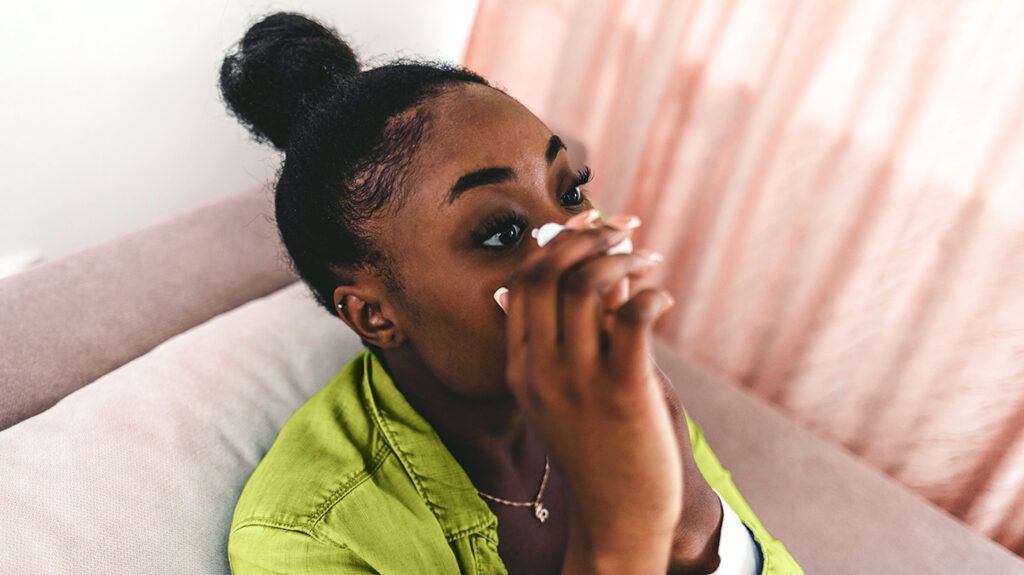Self-care for dry eye syndrome can include home remedies and over-the-counter treatments. People may need to see a doctor for further treatments for severe dry eye.
People may be able to treat mild dry eye at home. Artificial tears and protecting the eyes from environmental triggers, such as wind, dry climates, and air conditioning, may all help.
This article discusses managing dry eye symptoms at home and avoiding triggers, self-care tips, and when to contact a doctor.

Eye drops, or artificial tears, can help ease dry eye symptoms. They lubricate the eye and support the tear film, which helps protect the eye’s surface.
People can buy over-the-counter (OTC) eye drops for dry eye and use as much as they need.
If a person uses eye drops more than four times daily or has an allergy to preservatives, they can use preservative-free eye drops. This can help avoid irritation from frequent use of eye drops with preservatives.
People may want to use a thicker ointment or gel for severe dryness. It is best to use these before bed, as they can temporarily blur vision.
Avoid eye drops to treat red eyes. These work as decongestants, which, over time, may worsen dry eye symptoms.
People may find the following home remedies helpful for dry eye self-care.
- Use an eyelid wash: Gently washing the eyes with baby shampoo or an eyelid cleanser
may improve dry eye symptoms. People can gently massage the closed eyelids and then thoroughly wash off the shampoo or eyelid cleanser. - Eat foods containing omega-3 fatty acids: Increasing omega-3 in the diet or taking omega-3 supplements
may help relieve dry eye, although further research is necessary. Food sources of omega-3 include walnuts, flaxseed, and oily fish, such as salmon and mackerel. - Apply a warm compress: Regularly applying a warm compress to the eyes may help reduce inflammation and ease symptoms. To do this, people can wet a clean washcloth or cotton pad and gently hold it against the eyes. A person can reheat the washcloth in hot water as needed.
- Blink more: Blinking more can help reduce dry eye symptoms, particularly when doing activities that reduce blinking, such as staring at a screen or reading.
- Stay hydrated: Dehydration can dry out the eyes, so people can aim to stay well-hydrated by drinking 8 to 10 glasses of water every day.
- Wear wraparound sunglasses: Wraparound sunglasses help protect the eyes from dry atmospheres and wind when outside.
- Using a humidifier: A humidifier can prevent a dry, warm room from drying the eyes by helping replace moisture in the air.
- Massage the eyelids: Massaging the eyelids may help reduce inflammation around the eyes’s surface and treat dry eye symptoms.
- Get enough sleep: Getting enough quality sleep may help with dry eye. People should aim for
7 to 8 hours every day.
Learn more about natural remedies for dry eye symptoms.
Limiting or avoiding dry eye triggers may help people manage their symptoms. This may include avoiding:
- Fans or hair dryers: These can dry out the eyes, especially if held close to the face. Avoid blowing air directly toward the eyes or avoid using them altogether, if possible.
- Warm rooms: Adding moisture to warm air can help prevent the eyes from drying out. Use a humidifier or place a pan of water near a heat source.
- Wind or dry climates: Wind and dry climates can dry the eyes. Wear wraparound sunglasses outside to protect the eyes.
- Waking up with dry eyes: Some people find dry eye symptoms worse upon waking, so applying eye drops before going to sleep may help.
- Smoke: Smoke from fires or cigarettes may dry out and irritate the eyes. Avoid fires or smoking when possible or stay in well-ventilated areas.
- Contact lenses: Prolonged use of contact lenses may contribute to dry eyes. Taking breaks from wearing them or switching to glasses may help.
Some medications may cause dry eye. These include:
- beta-blockers
- diuretics
- antihistamines
- sleeping pills
- heartburn medications
- anxiety medications and antidepressants
If people think a medication is contributing to their dry eye symptoms, they can talk with a doctor. A doctor may be able to suggest ways of managing side effects or prescribe an alternative.
A person can contact a doctor if they have dry eye and symptoms are not improving with home remedies, if symptoms worsen, or if dry eye is affecting everyday activities.
A doctor may recommend other treatments if self-care is not effective. This
- prescription eye drops, such as cyclosporine or lifitegrast, which increase tear production
- tear duct plugs, which block the tear ducts to help reduce tears draining from the eyes
- for some people, surgery may correct loose eyelids and help tears stay in the eyes
Without treatment, severe dry eye may cause damage to the cornea of the eye, so getting the proper care is important.
People may be able to relieve dry eye symptoms at home by applying eye drops, avoiding triggers, and adopting certain lifestyle changes.
For people with more severe cases, or if home remedies are not effective, they may need medical treatments, such as prescription eye drops, tear duct plugs, or surgery.
